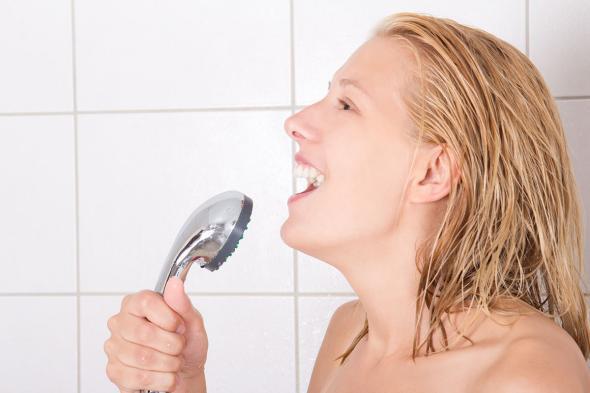For most of my life, my morning shower was a media-free zone. In recent years, in fact, it was my only media-free zone. At any given moment, I consume media: While cleaning the apartment or walking to the Metro, I listen to podcasts. While cooking, I half-watch Madame Secretary or Law & Order: SVU on Netflix. While getting ready for the day, I have CNN on in the background. While working out, of course, I have music. (Bad music.) I read, I listen, I watch—from when I wake up and check my phone until I put my Kindle on the bedside table at night.
Except, for a long time, when I was in the shower. For 15 minutes or so in the morning, I was forced to be alone with my thoughts. “It builds character,” I told myself. I had to talk to myself, because there was nothing else to occupy me. When I heard that some of my colleagues listen to podcasts in the shower with the help of a ziplock bag, I scoffed. I guffawed. I condescended. “They can’t even go without media while they’re in the shower? They have a problem,” I congratulated myself.
And then I gave in. Oh god, I gave in.
It started in the summer of 2016, soon after my husband went out of town for work for a few months. The timing was terrible, as I was also grieving the loss of two family members. Each morning, when I put down the phone and went into the bathroom to shower, the quiet got to me. It was at that moment that my isolation felt most acute, that I couldn’t stop my thoughts from churning—the regret about things unsaid to my loved ones, the chains of events I wish I could have broken, the things on my to-do list that I worried I wouldn’t have the energy to tackle.
I knew the real solutions to the problem, the things my therapist would have (and did) suggest: more yoga. More mindfulness and intentionality. Sitting with the feelings. Instead, I drowned them out. One morning, I put my iPhone in a glass on a ledge in the bathroom, and I turned on NPR One—NPR’s most excellent app, which Terry Gross described in one ad as “sort of like Pandora for public radio.” It’s been part of my daily routine ever since. As the shower starts, I get the national news roundup from the top of the hour. Then it gives me the Washington, D.C., area headlines before heading to individual stories, selected based on my previous listening habits.
Before I gave in to NPR One in the morning, I was a bit like an alcoholic who swore that she had her problem under control because she never cracked a beer before 5 p.m. on the dot. Clearly I didn’t have a media problem, I thought, because I have this whole long period every morning in which I am alone with myself. Yes, I know that 15 minutes per day of media-free time is not actually a long period. But logic had no place in my media habit. When I crossed that Rubicon and began listening to NPR One during my ablutions, I admitted that I now strongly desired, maybe required, external mental stimulation at all times.
As the editor of Future Tense—Slate’s partnership with Arizona State University and New America, about how emerging technologies change our lives—I know the research and the debates about our media addiction. I know attention is a commodity. I know it’s tragic that we can’t stand in line at the grocery store without pulling out a phone. I know that being alone with your thoughts can support creativity and personal growth. I know I am conditioning myself to be more easily distracted.
Admitting you have a problem may be the first step to recovery, but for now, I’m stalling out here. I don’t intend to fix myself any time soon. My morning NPR One listen has become a comforting part of my routine, and listening to public radio has given me a little bit of a boost at work, making me aware of stories I might otherwise have overlooked. The rationalization is winning out over the self-awareness. May my attention span rest in peace.
But you—it’s not too late. Keep that quiet time in the shower. When it’s gone, you may not actually miss it. But you’ll probably miss that sense of superiority that it gives you.
